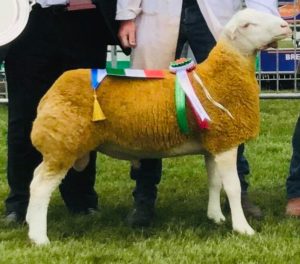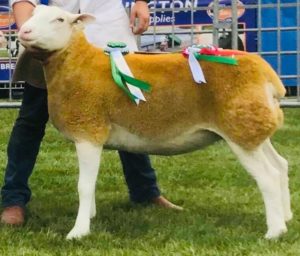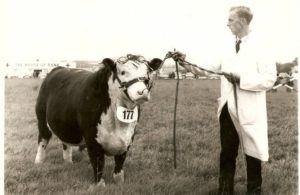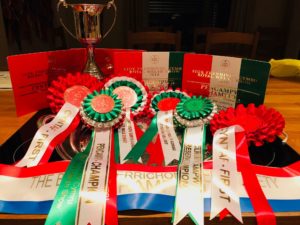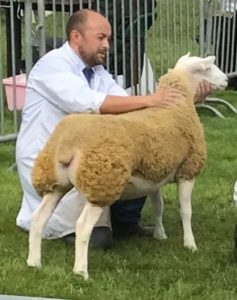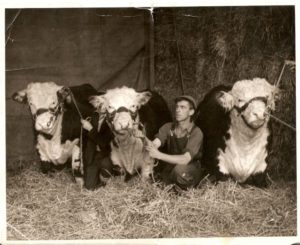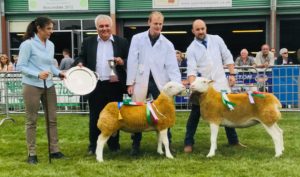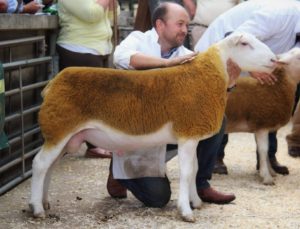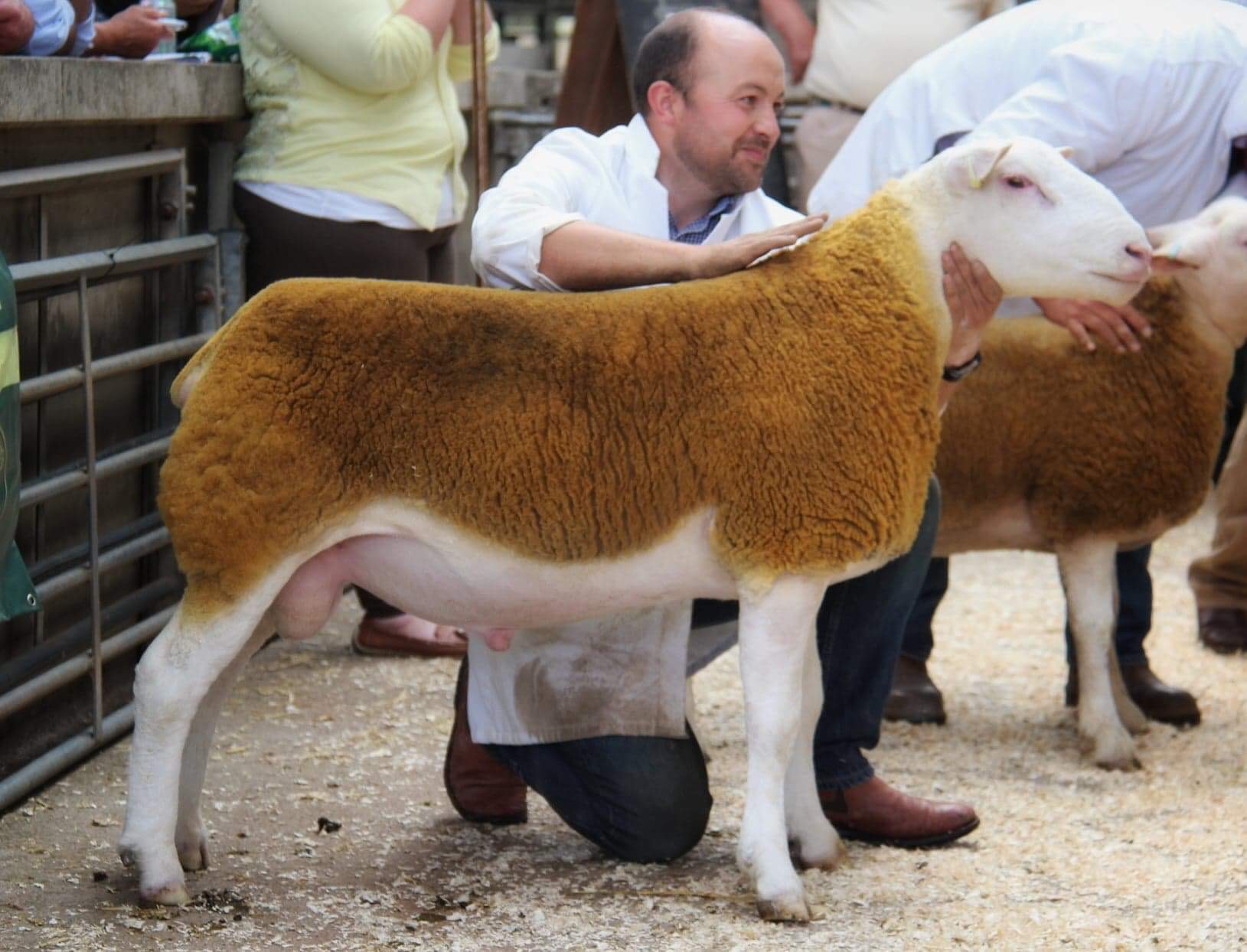This month we have decided to ask one of our fieldsman who has his own flock of sheep to do the producer profile. Here is his story…
Adrian is one of Meadow Quality’s Livestock Marketing Specialist based in Wales, he has been with us since 2007. As well as working for us he also runs his own flock of pedigree Berrichon sheep as well as his Welsh Mountain ponies and cobs.
Farming is in Adrian’s blood, stemming from his father’s family farming in Pembrokeshire for over three centuries. On his mother’s side, her father was a first-generation farmer starting off as a farm hand during World War II; this is where Adrian’s love for showing livestock started. His grandfather was into showing pedigree Hereford cattle winning championship at the Royal Welsh Show as well as exporting Hereford cattle to South America. He also won the Welsh National Sheepdog Trials and took the NPS Peterborough Championship with his ponies. When he took a step back into retirement, he started showing budgies and canneries winning overall champion at National Show (NEC) with a white canary! This was the first time it had ever been achieved.
Working for Meadow Quality for over twelve years Adrian said he has gained a lot of experience working and trading with steak holders within the agriculture supply chain. He says it ‘gives you an understanding of all the aspects within the supply chain and what we need as a sector to continuously improve. Every day is a school day. The job gives you an insight and knowledge of the agriculture sector.’ He enjoys it immensely and is grateful that the company has kept him employed as well as being able to live and work within his rural community. Adrian said there are challenges within the job as it is an ‘ever changing climate within agriculture especially with the markets and the trade role it can change on an hourly basis let alone daily.’ When Adrian was asked where he aims to have the farm in five years’ time his response was to have his own farm where he can improve his pedigree stock; as at present he rents the land and buildings, as well as still working for Meadow Quality.
With the dreaded ‘B’ word looming on the horizon I asked the question ‘Brexit… Your opinion?’ Adrian believes that the agriculture sector has a unique position post Brexit as it is the only primary industry, on scale, left in the UK producing products to be traded.’ He also said, ‘the government will need to encourage and work with the agriculture sector to have produce to products to trade with on the world market; just like New Zealand and Ireland.’ He does recognise that the current farming practices will have to adapt, even if it means lambing commences later in the calendar to meet home demand rather than pushing for an early export. Adrian also points out that with the benefit of more forage cost per kg of lamb produced should reduce, will it make enterprises more profitable? but there are a lot of questions we do not know the answers to. Adrian can see Brexit as being an opportunity for the next generation of farmers.
I asked him where he sees the future of farming putting Brexit to one side, and his response was a very positive one ‘Farming has and always will be a part of the makeup of rural Britain. As business enterprises we need to continue striving to be efficient in whatever we do to be economically viable. We cannot always control what price we get for our products, but we can continuously improve our cost of production, every % saved is extra margin. For the industry to move forward and to be efficient we need to work more closely together to produce consistent products. Beef, dairy, sheep and all the different sectors must work together to be successful! The pig and poultry sectors operate tight and efficient supply chains, where every stakeholder knows their task and what value they are adding to the product. This is something I believe will be the future of ruminant farming to make it a success.’
In the interviews I conduct with the farmers I like to ask who their farming icons are, we have had parents, neighbours and big industry names. Adrian’s response is the farming entrepreneurs whether it is sheep, beef, dairy or other farmers continuously improving their enterprises and enjoys learning from these farmers who constantly strive for efficiencies.
I couldn’t help but ask Adrian about his sheep and horses; the farm he grew up on was beef and as a part time enterprise an equine farm was ran. The family has had huge successes at the Royal Welsh Show in 2007 where a homebred Welsh Mountain pony mare won supreme champion out of the WHOLE show and went on to qualify for Horse of the Year show at the Birmingham NEC, where she won Supreme pony champion. In 2016 they won again but for female champion Welsh Cob mare. With such success with the ponies Adrian have been lucky enough to be on a panel of judges for Welsh Pony and Cob Society allowing him to travel all over the world to America and Australia as well the UK and Europe.
Recently he has taken to showing British Berrichon sheep, within the short time frame he has had success with his flock. Second time round showing his sheep he won the ewe lamb class at the Royal Welsh Show in 2018, in that Autumn, Carlisle sale he gained second highest price for a ram lamb. This year surpasses all his expectations where in July with the ‘Early First Choice’ where a homebred ram, Glyncoch the Joker, was top priced yearling. The Royal Welsh came along where he won the ram class with Glyncoch Usain and the gimmer class with Glyncoch Time Bomb. The ram won overall male champion and the gimmer becoming overall reserve champion.
Adrian’s closing line to me was ‘It gives me great pride that the success with homebred stock that I can carry on family traditions.’
